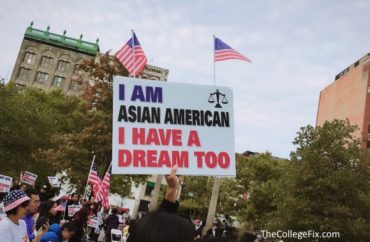
‘The merit-based principle should not be compromised to satisfy a political agenda’
Civil rights organizations for racial minorities cheered the Justice Department’s finding that Yale University discriminates against Asian Americans and white applicants in admission.
The federal government also ordered Yale not to use race or national origin in this academic year’s admissions, and to get advance permission from the department before considering those immutable traits in future admissions cycles.
The finding is not only “a crucial step in the government stepping in to solve the systematic anti-Asian discrimination issue, but will also pinpoint a right direction for our schools and universities,” Wenyuan Wu, director of administration for the Asian American Coalition for Education, told The College Fix in a text message.
“The merit-based principle should not be compromised to satisfy a political agenda for racial diversity,” said Wu, who is also executive director of Californians for Equal Rights, which is fighting to preserve California’s ban on racial preferences. “This development is encouraging to many others who are fighting for the same principle of equal rights for all elsewhere.”
“The Yale case hopefully can be a reckoning for people to understand that racial preferences have lasting consequences that stretch beyond black or white,” Californians for Equal Rights spokesperson Kenny Xu told The Fix in an email. “We don’t live in that kind of country anymore.”
Complaints from Asian Americans ‘can’t be so easily discounted’
The department notified the prestigious Ivy League institution Aug. 13 that the government concluded Yale “illegally discriminates against Asian-American and white applicants in its undergraduate admissions process in violation of Title VI of the 1964 Civil Rights Act.”
It said that for “the great majority of applicants, Asian American and White applicants have only one-tenth to one-fourth of the likelihood of admission as African American applicants with comparable academic credentials.”
Civil rights organizations issued public statements thanking the Justice Department for giving this alleged discrimination the attention it deserves.
MORE: Yale denounces results of ‘hasty’ two-year federal investigation
One of them is the National Center for Public Policy Research’s Project 21. The black leadership network promotes the “views of African-Americans whose entrepreneurial spirit, dedication to family and commitment to individual responsibility have not traditionally been echoed by the nation’s civil rights establishment.”
Project 21 highlighted the leading role of Asian American groups in changing the lens through which racial preferences are analyzed.
“For so long, complaints against racial preferences in admissions fell on deaf ears because the complaints came from white students,” Project 21 member Derryck Green said in the statement. “The justification was that current discrimination in favor of blacks is necessary recompense for historical discrimination against blacks.”
More recently, “complaints are coming from Asian students – largely seen as a silent minority – who can’t be so easily discounted,” he continued. “It is now clear that academic achievement should be rewarded without racial contingencies.”
Asian-American children ‘have been long scapegoated’
The impetus for the Yale investigation came from a 2016 complaint by AACE, Wu’s group, against Yale, Brown University and Dartmouth College. It was informed in 2018 that the allegations against the latter two were too vague and “conclusory” for investigation.
“AACE welcomes the Federal Government’s concrete actions to safeguard equal education rights for all American students, regardless of race, sex, color, ethnicity or national origin,” the organization stated in a press release.
It called the Justice Department’s finding “a major milestone in the Asian-American community’s courageous fight to defend the American creed of equality and meritocracy.” The coalition highlighted the Justice Department’s requirement – presumably enforced through litigation – that Yale “submit a plan that demonstrates it strictly observes all federal laws and the principle of narrow tailoring in its admissions program” and also “identify a date to end racial discrimination.”
In the statement, President Yukong Zhao praised the feds for working to protect “the equal rights of Asian-American children who have been long scapegoated by racial preferences in education.” He urged colleges to judge American applicants “by their merits and the content of their character, not the color of their skin!”
Ward Connerly, president of Californians for Equal Rights and chairman of the successful ballot initiative to end racial preferences in 1996, said defenders of racial preferences were fighting longstanding American attitudes.
“We know Americans oppose racial preferences in admissions by a factor of 3 to 1,” he said in a statement without identifying the source of his claim. (It may have been a March 2019 Pew survey.) “Americans oppose discrimination of all kinds, and want government to treat everyone equally.”
Title VI of the Civil Rights Act is why “grassroots activists all across the country are fighting for equal treatment in the most proud institutions of American life – our university system,” Connerly said.
Horace Cooper, co-chairman of Project 21, praised President Trump and his administration “for standing up for the colorblind principle in America. Our schools absolutely must live up to this commitment.” Favoring “some racial groups over others harm us all.”
MORE: Feds investigate Yale for anti-Asian admissions practices
Like The College Fix on Facebook / Follow us on Twitter






Please join the conversation about our stories on Facebook, Twitter, Instagram, Reddit, MeWe, Rumble, Gab, Minds and Gettr.